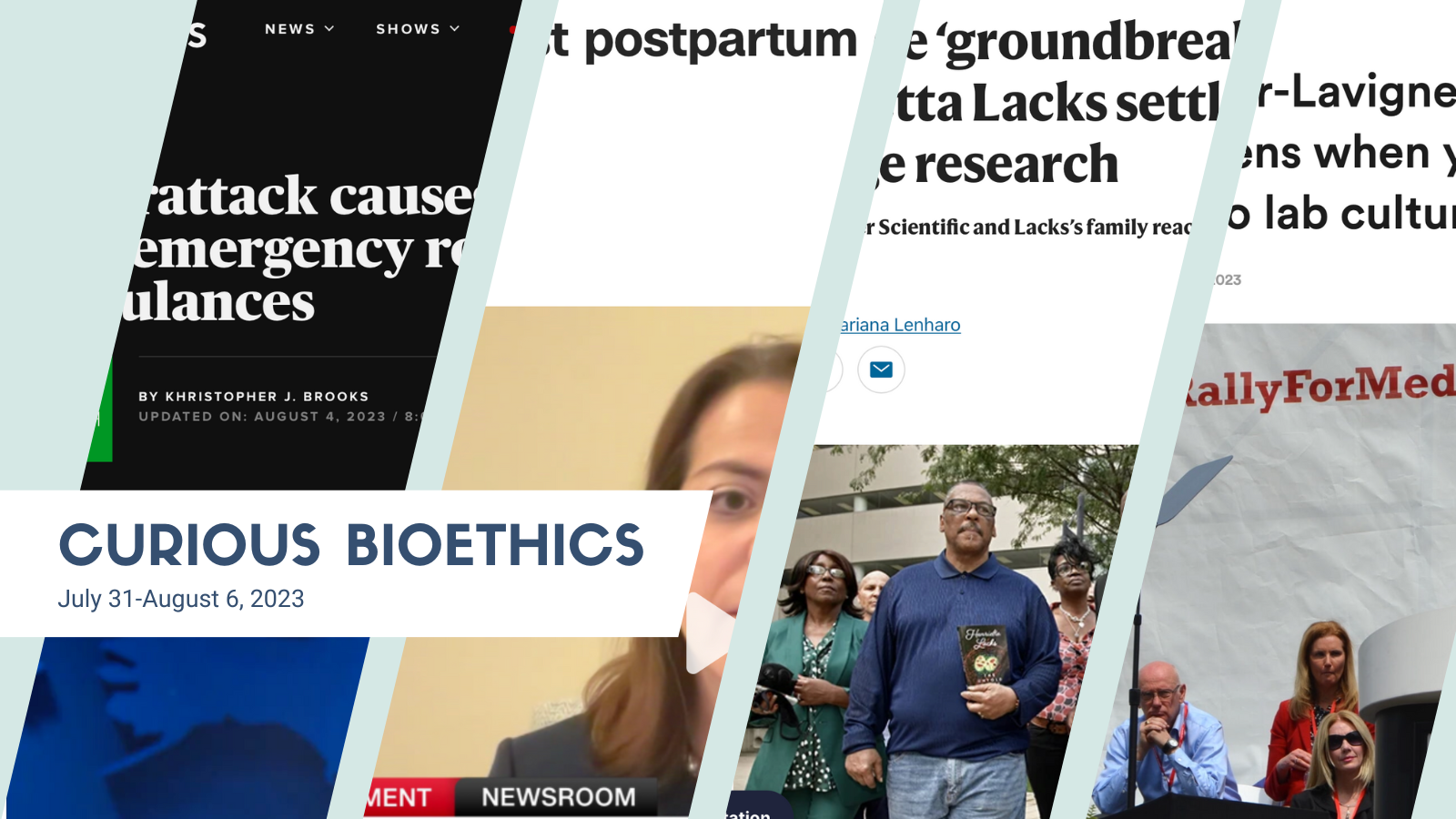
In today’s curated collection, you’ll find:
- 🗞️Bioethics News: Henrietta Lacks’ suit settled; Postpartum depression pill approved; cyberattacks on hospitals
- 📚Recommended Reading: Grief and poetry; research misconduct & culture
- 🦉Educational Opportunities: Trauma-informed care & neurobiology
Note: Today’s news references self-harm and death.
Hey there, Curious Human!
🗞️ Bioethics in the News
How the ‘groundbreaking’ Henrietta Lacks settlement could change research
Thermo Fisher Scientific and Lacks’s family reach a deal over the unethical use of her cells.
Earlier this week, the biotechnology company Thermo Fisher Scientific reached a settlement with the family of Henrietta Lacks, a Black woman who had cells taken from her and used for research without consent more than 70 years ago. The cervical cancer cells, removed during Lacks’s treatment at Johns Hopkins Hospital in Baltimore, Maryland, and known as HeLa cells, were shared widely because of their ability to survive and divide indefinitely in the laboratory — and have led to numerous scientific discoveries. Eventually, they made their way into the hands of companies such as Thermo Fisher in Waltham, Massachusetts, which sells products derived from the cells.
FDA approves first postpartum depression pill in the US
Zuranolone (trade name: Zurzuvae) is the first oral medication approved to treat postpartum depression (PPD). The fast acting 14 days course of once-daily pills can reduce significant barriers to treatment for this serious condition.
Postpartum depression is a major depressive episode occurring later in pregnancy or after birth. PPD is a serious mental health condition impacting up to 1 in every 7 postpartum patients. Data suggests suicide may account for up to 20% of postpartum deaths.
“The most common side effects include drowsiness, dizziness, diarrhea, fatigue, nasopharyngitis (the common cold), and urinary tract infection. Use of Zurzuvae may cause suicidal thoughts and behavior. Zurzuvae may cause fetal harm. Women should use effective contraception while taking, and for one week after taking, Zurzuvae.” – FDA
Cyberattack causes multiple hospitals to shut emergency rooms and divert ambulances
Prospect Medical Holdings, a private equity healthcare company, endured a system-wide cyberattack, impacting hospitals in California, Connecticut, Pennsylvania, and Rhode Island, and over 160 clinics. While the attack was on the Los Angeles-based company, the cyber network impacted multiple states.
Globally, the healthcare industry continues to be the top target for cyberattacks in the year ending in March, according to IBM’s annual report on data breaches. For the 13th straight year, that sector reported the most expensive breaches of any field, averaging $11 million each. That’s nearly double the average impact of a breach on the second-largest sector, finance, at $5.9 million each.
The hospitals are unlikely to have networks functioning until next week, leaving clinicians to resort to paper charting.
Data security breaches place patients in serious harm. We are so reliant on digital records that when we switch back to paper, we cannot access patients’ history, medication records, or other relevant information. We can’t click a button to see a patient’s X-rays or laboratory values. There is minimal infrastructure to switch back to a paper system overnight.
When the computers go down, the emergency departments close, diverting patients to other hospitals. This means longer time to emergency care, further increasing harm to patients with serious conditions.
📚 Recommended Reading
Ahead of Time
On poetry and mourning
Ninety-three days before she died, my sister sent me a message. Five and a half years earlier, Bita had been diagnosed with stage four intrahepatic cholangiocarcinoma, a rare and deadly form of cancer. She was forty-three. There was a thirteen-centimeter mass—roughly the size of a grapefruit—in her liver. When the radiologist friend who’d helped get Bita into Memorial Sloan Kettering Cancer Center saw me in the hospital corridor after her diagnosis, he burst into tears.
-Kamran Javadizadeh
If you’re looking for more beautiful, long essays to read, I found Kamran Javadizadeh’s moving Yale Review essay through Longreads Top 5 Longreads of the Week. Maybe you’ll find your next read there too.
Marc Tessier-Lavigne’s resignation shows what happens when you don’t pay attention to lab culture
Research ethics is often thought about strictly in terms of personal misconduct, and not often enough in terms of interactions and structures within lab communities that tolerate, and sometimes implicitly promote, corner-cutting and rushing toward publication…
Think about it this way: If approval and rewards at work are directly linked only to results, not process, where do you put your efforts? When only desired data mean success, and when not producing “the right” data makes you a “loser,” the already fierce pressures are intensified.
🦉Educational Opportunities
No registration is required! Just go straight to YouTube for this on-demand bioethics education.
Trauma-Informed Care and Neurobiology of Trauma
Seattle Children’s Dr. Alysha Thompson explains what trauma-informed care is, why it’s important, and how it should fit into our approach to healthcare.
I believe deeply learning and applying trauma-informed practices is the key to healthy, trusting, meaningful relationships with patients. Understanding this framework also empowers us to see the structural factors that traumatize our communities.
That’s it!
As always, thanks for being curious!
Please email me at the blog and let me know what ethics issues you are most curious about this week—I’d love to hear from you! If you have an upcoming or past webinar available to the public, please send it my way to be featured.
Alyssa Burgart, MD, MA is co-editor of BioethicsToday and a clinical associate professor at Stanford University. She also writes at Poppies & Propofol.